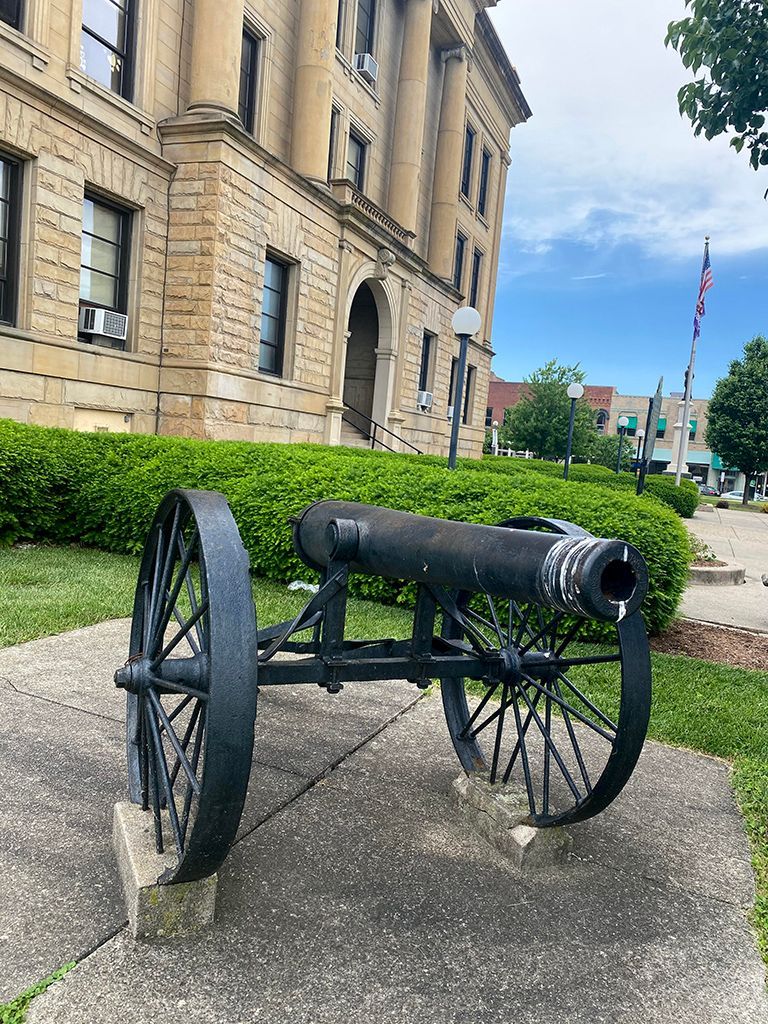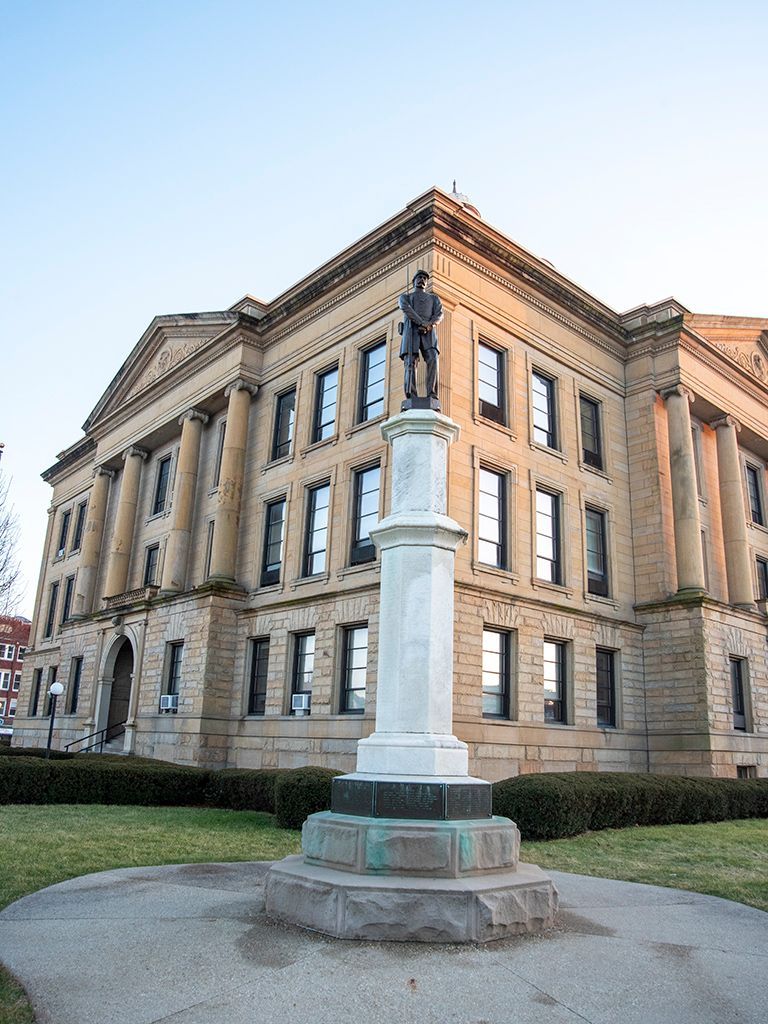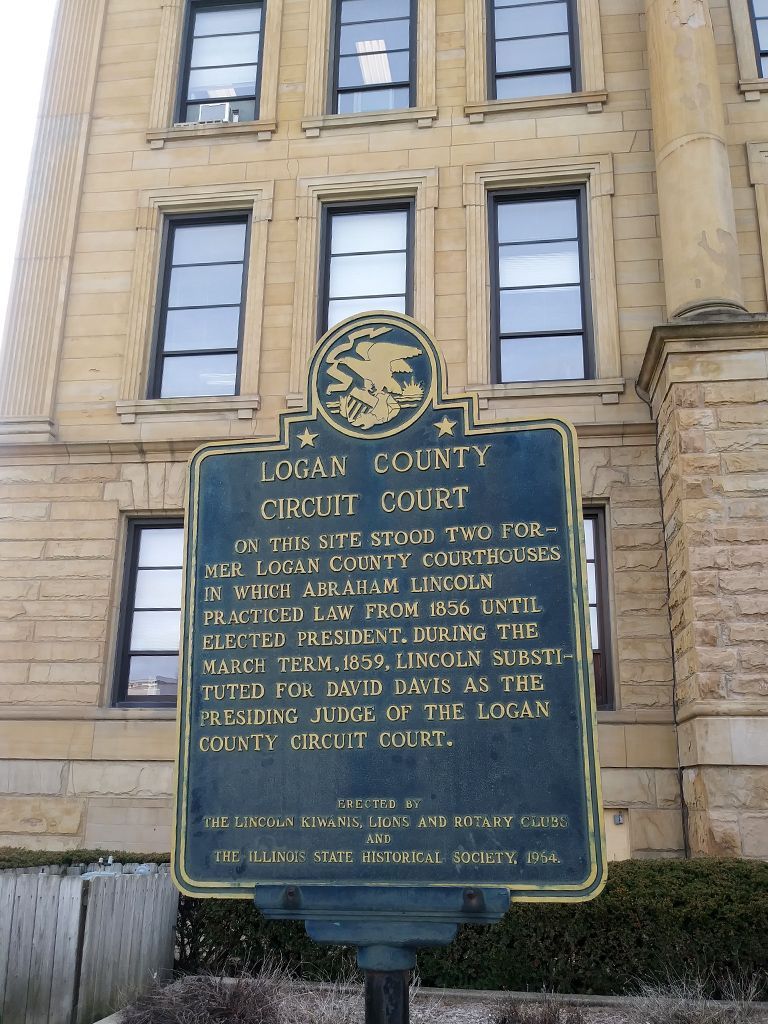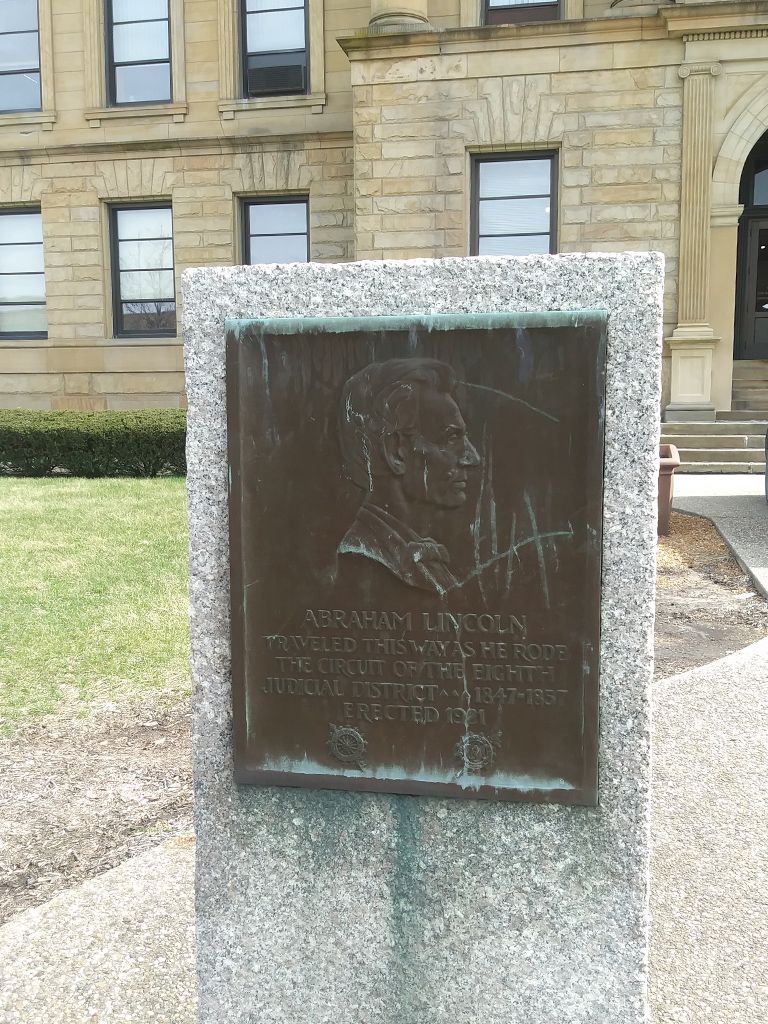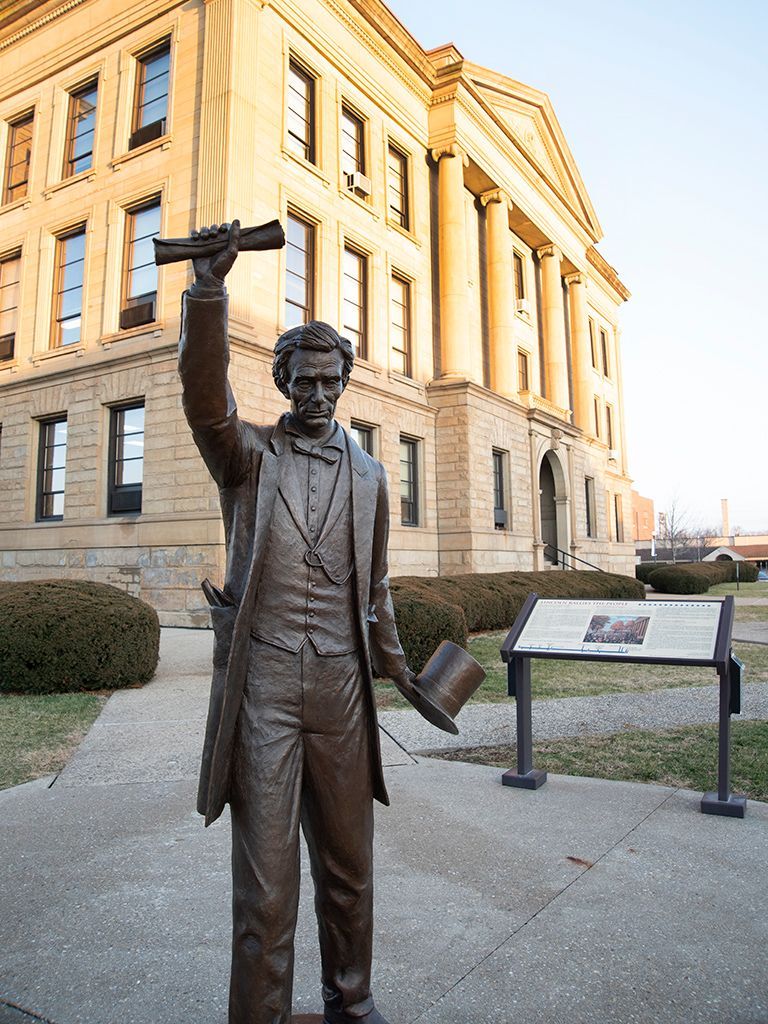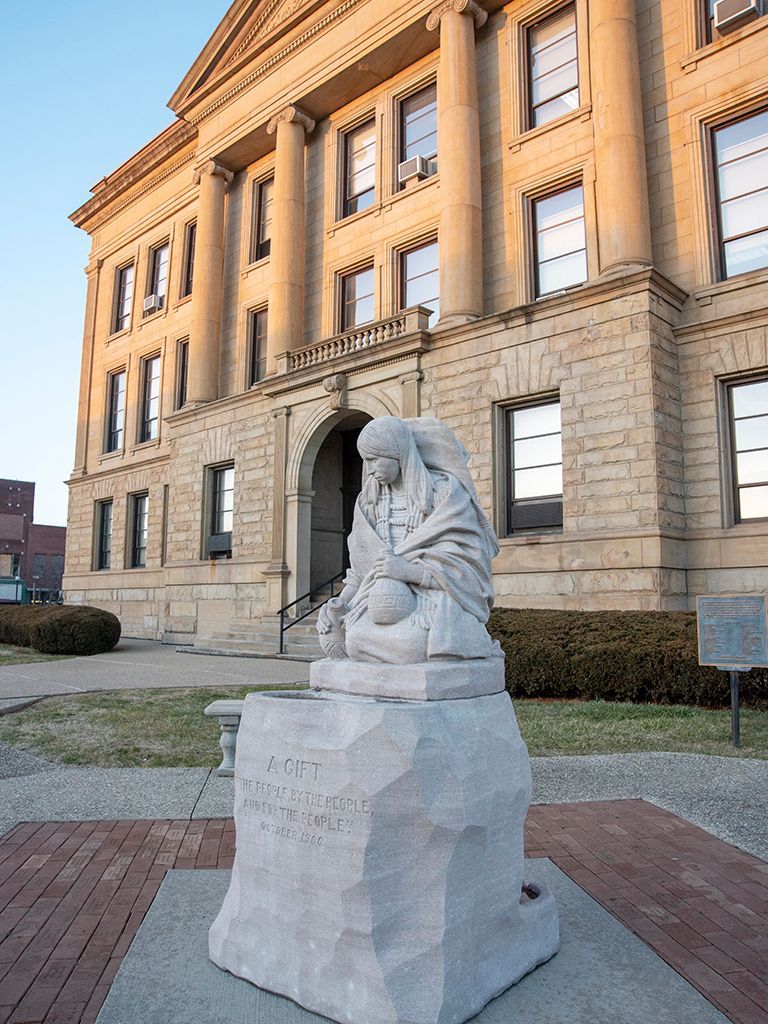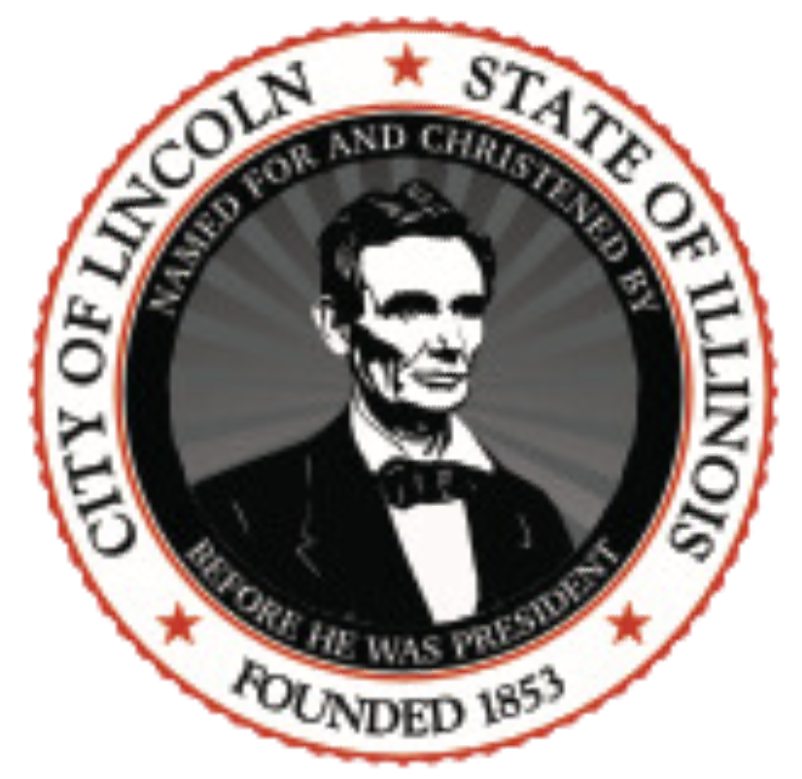Deskins Tavern Historical Marker & Well
915 5th St.
Lincoln, IL 62656
In the 1840's, Deskins Tavern and Inn was a popular location for Lawyers and judges on the 8th Judicial Circuit, when Abraham Lincoln was a lawyer. The tavern was located across the street from the Postville Courthouse. The original well from the 1830's stands on the Tavern location along with a historical marker and an interpretive panel/ replica drawing by Lloyd Ostendorf, depicting Abraham Lincoln and Judge David Davis.
Lincoln Christian Church Historical Marker
The original Christian Church, once located next to the current library on Pekin Street, served as a temporary courthouse from 1857 to 1858 after the first courthouse was destroyed by fire in 1857. During this period, Abraham Lincoln may have appeared in court at the church and possibly even presided on behalf of Judge David Davis. The commemorative plaque marking this history was lost for many years but was rediscovered in 2017 and now resides in the foyer of the present-day Lincoln Christian Church.
Lincoln Christening Site
101 N. Chicago St.
Lincoln, IL 62656
(217) 732-8687
his site marks the spot where Abraham Lincoln christened the town with watermelon juice on August 27, 1853. Today, a watermelon statue and an interpretive panel commemorate the event. The site is located on the south lawn of the Logan County Visitor Center and Historic Train Depot.
Lincoln Heritage Museum - Lincoln College
1115 Nicholson Rd.
Lincoln, IL 62656
(217) 735-7399
Discover the Lincoln Heritage Museum, located on the historic campus of Lincoln College—founded in 1865 as the first college named in honor of Abraham Lincoln. At the heart of the campus stands University Hall, built in 1865 and still in use today.
Step inside the museum and embark on an interactive journey through history. Explore a remarkable collection of rare and valuable artifacts that bring to life the story of Abraham Lincoln and the era in which he lived.
Lincoln House (Hotel) Historical Marker
This site was once home to the original Lincoln House (Hotel), constructed in 1854 by the founders of the City of Lincoln—John D. Gillett, Virgil Hickox, and Robert B. Latham. The hotel was destroyed by fire in 1870 but was rebuilt in 1875 by John Gillett. Abraham Lincoln frequently stayed at the hotel, along with other notable figures of the time. It was here in 1858 that Lincoln met the renowned sculptor Leonard Volk to arrange for the creation of his life mask and hand casts.
Lincoln Rustic Scene of Conspiracy
412 Pulaski St.
Lincoln, IL 62656
For more information visit HERE
In 1876, this site was the scene of a plot to steal Abraham Lincoln’s body and demand a $200,000 ransom.
Lincoln Train History Markers
111 N. Sangamon St.
Lincoln, IL 62656
Elm Park served as the heart of Lincoln’s social and commercial life. Shown here is the original Lincoln House, a hotel built in 1875.
At this location, six interpretive panels were installed to honor significant events in the city's railroad history and its connection to Abraham Lincoln. Four of the panels feature replica illustrations by Lloyd Ostendorf, depicting key moments involving Abraham Lincoln.
Lot Owned By Abraham Lincoln
523 Pulaski St.
Lincoln, IL 62656
This site was originally known as "Town Lot Three in Block Nineteen," owned by Abraham Lincoln from 1858 to 1865. Today, it serves as a commercial space, but a commemorative plaque and interpretive panel mark its historical significance. The panel features a replica of Lloyd Ostendorf's 1978 drawing, illustrating Lincoln paying taxes on the lot.
Postville Park Historical Marker
1300 5th St.
Lincoln, IL 62656
Postville was established in 1835 and served as the first county seat. It was home to the original town square, where a young Abraham Lincoln was known to play ball with his friends. In 1853, the city of Lincoln was founded nearby and grew rapidly. By the 1860s, Lincoln's expansion led to the annexation of Postville, which then ceased to exist as a separate township.
Robert B. Latham Home Historical Marker
1 Latham Pl.
Lincoln, IL 62656
Former site of the home of Robert B. Latham, a founding father of the City of Lincoln and a close associate of Abraham Lincoln.
Samuel C. Parks Historical Marker
1300 5th St.
Lincoln, IL 62656
For more information click HERE
This site once housed the law office of Samuel C. Parks, a close friend of Abraham Lincoln and a fellow attorney on the 8th Judicial Circuit. Parks and Lincoln shared office space and maintained a strong professional relationship, with Parks later playing a significant role in Lincoln’s political rise.
Stephen Douglas Speech Historical Marker
Near corner of 4th St. and Decatur St.
Lincoln, IL 62656
For more information click HERE
During the 1858 senatorial campaign, Abraham Lincoln stopped at this site to listen to his opponent, Stephen Douglas, speak at a political tent rally. Today, you can view a historical marker here, along with an interpretive panel featuring a drawing by Lloyd Ostendorf. Be sure to also visit the nearby Lincoln Train History Markers.
Logan County Courthouse
601 Broadway St.
Lincoln, IL 62656
(217) 735-2376
Learn more of the history of the existing courthouse as well as previous courthouses HERE
Constructed in 1905, this three-story stone courthouse, crowned with a majestic dome, stands as a historic landmark and the centerpiece of Lincoln’s Downtown District. Still serving as the active courthouse and the seat of Logan County, the building continues to play a vital role in the community. Upon entering, visitors are greeted by a striking mosaic of the Illinois State Seal embedded in the floor. Overhead, a beautiful stained-glass dome casts colorful light across the space. Surrounding the dome are murals depicting iconic local landscapes, including Elkhart Hill, the Old Postville Courthouse, Mt. Pulaski Courthouse, and the 1857 Lincoln Courthouse. Also adorning the interior are portraits of notable figures such as Abraham Lincoln, Dr. John Logan, Stephen A. Douglas, and Governor Richard J. Oglesby.
*Surrounding the courthouse lawn are other important historical markers and statues.


